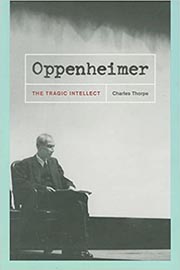Oppenheimer: The Tragic Intellect
by Charles Thorpe
Reviewed July 5, 2007
 Oppenheimer: The Tragic Intellect is a not a typical biography. Within the past few years, there have been many notable books written about the life and times of J. Robert Oppenheimer, and this book provides another fine chapter to the story of this complex man.
Oppenheimer: The Tragic Intellect is a not a typical biography. Within the past few years, there have been many notable books written about the life and times of J. Robert Oppenheimer, and this book provides another fine chapter to the story of this complex man.
Author Charles Thorpe, drawing upon his doctoral dissertation, weaves together a study of Oppenheimer from the viewpoint of a sociologist. The book focuses on the broader social context of Oppenheimer's life. As David Cassidy, author of J. Robert Oppenheimer and the American Century commented; "Thorpe provides new perspective on Oppenheimer's evolution as a scientific intellectual and cultural icon..."
Thorpe explores the way that Oppenheimer shaped himself, but also how society affected him as well. Oppenheimer is often portrayed as both a hero and a martyr, but this work portrays Oppenheimer as a bridge between different worlds. The Manhattan Project ushered in the era of “Big Science”, where scientists, industry and the military all began to intersect closer than ever before. It is here at this nexus that Oppenheimer found his primary role, as leader of the team of scientists racing to develop the atomic bomb and the military who wished to use it.
Even after the war, Oppy kept this role, this time acting as a bridge between the world of science and the world of policy. Although the events of the 1954 security hearings changed many aspects of this role, he continued to be the voice of many scientists until his death.
Oppenheimer: The Tragic Intellect is a deep and thoughtful work, and should be read along with the other studies on the 'father' of the atomic bomb.
Available at amazon.com.